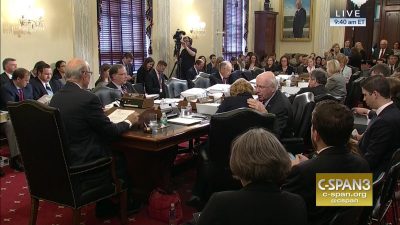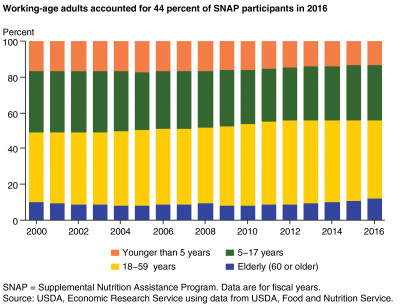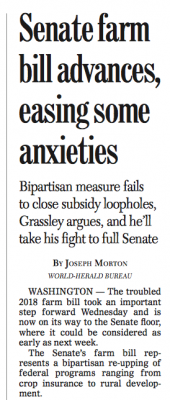The House Agriculture Committee unveiled a draft farm bill Friday that would revamp a key international food aid program, boost risk management options for specialty crop growers and nullify California's…
Farm Bill Passes Senate Ag Committee
Associated Press writer Andrew Taylor reported on Wednesday that, “A Senate panel approved a modest, bipartisan rewrite of federal farm and nutrition programs on Wednesday, sidestepping a fight for now but setting up a clash with House Republicans intent on beefing up work requirements for food stamps.

“The legislation, approved by a bipartisan 20-1 vote, would renew farm safety-net programs such as subsidies for crop insurance, farm credit, and land conservation. It also would extend the Supplemental Nutrition Assistance Program, widely known as food stamps, which helps feed more than 40 million people.
The panel’s approval comes as farm country is struggling with low prices and a potential trade war that could depress farm commodities prices further.
The AP article noted, “The House measure, which failed last month because of an intra-GOP battle over immigration, promises greater job training opportunities for recipients of food stamps, a top priority for House leaders like Speaker Paul Ryan. Democrats say the House measure is poorly designed and would drive 2 million people off of the program. A re-vote is likely in coming weeks.”

Mr. Taylor also pointed out that, “The [Senate] measure includes legislation by Senate Majority leader Mitch McConnell, R-Ky., that would legalize the production of industrial hemp, which is generally barred because hemp is related to marijuana, even though it contains little of that drug’s key psychoactive ingredient, known as THC…McConnell hopes to bring the measure to the Senate floor before the July 4 recess.”
At today's Senate Ag Committee hearing, @SenateMajLdr noted: we will get to the #FarmBill before the 4th of July pic.twitter.com/30LMb7m54C
— Farm Policy (@FarmPolicy) June 13, 2018
In addition, the AP article stated, “Sen. Charles Grassley, R-Iowa, was the sole ‘nay’ vote. He objected to the measure’s hemp provision, saying it should have been handled within the Judiciary Committee that he chairs. He also wants to tighten eligibility standards for farm subsidies to target them to working farmers — closing a loophole that allows family members who do not work on farm to claim them as well.”
As #farmbill2018 negotiations continue, I am proud to stand behind my fellow Iowa colleague @ChuckGrassley as he exposes loopholes that non-farmers have taken advantage of to collect gov subsidies. #IA01
— Congressman Rod Blum (@RepRodBlum) June 13, 2018
DTN Political Correspondent Jerry Hagstrom and DTN Ag Policy Editor Chris Clayton explained on Wednesday that, “The Senate bill lowers income levels for farmers to collect commodity or conservation payments from $900,000 adjusted gross income to $700,000 AGI. Grassley, though, wants to tighten language on active engagement on the farm and re-establish a tight payment cap. His amendments on those issues, though, were stalled Wednesday because of technical challenges with his language. So Grassley now will attempt to bring his payment fight to the Senate floor.”
More specifically, Hagstrom and Clayton indicated that, “An effort led by Sen. John Thune, R-S.D., and Sen. Sherrod Brown, D-Ohio, to improve the Agricultural Risk Coverage (ARC) program did not come up for an amendment vote. Thune noted the program is at risk of losing value to farmers even though more than 77% of all base acres are enrolled in ARC. Still, the committee did not find a way to enhance the program moving forward.
“‘We will not have going forward in Title I a program that provides revenue protection, that provides protection not only against price loss, but production loss, and I think that’s unfortunate,’ Thune said.
“Thune said senators haven’t been able to get budget scores or find offsetting revenue to make changes in ARC work. Thune wants to update base acres as a way to get acres off the base rolls that have not been farmed in several years but that still collect commodity payments.”
The DTN article added that, “[Committee Chairman Pat Roberts (R., Kans.)] noted he expects a large share of farmers will shift to the Price Loss Coverage (PLC) program, but Roberts also said bankers and others have cautioned against changing base acres.
A base-acre update would drop 436,000 acres from base in Kansas alone, he said, which would lead to a 20% drop in land values, Roberts said. ‘The same thing would happen in Oklahoma and other areas of the High Plains,’ Roberts said.
Jeff Daniels reported on Wednesday at CNBC Online that, “The Senate Agriculture Committee on Wednesday passed the massive farm bill by a 20-1 vote and overcame an attempt to tighten subsidy payments to farmers.
“The draft farm bill, officially known as the Agriculture Improvement Act of 2018, contains more than 1,000 pages and covers everything from farm subsidies and food stamps to trade and rural development policy. Farmer assistance includes commodity payment programs, as well as subsidized crop insurance.
“Sen. Chuck Grassley, R-Iowa, cast the sole ‘no’ vote, because his amendment to limit subsidy payments wasn’t added to the proposed bill. Grassley wants to tighten the federal payments to focus on family-size farm operations.”
The CNBC item stated that, “Earlier in the panel’s meeting, Senate Majority Leader Mitch McConnell, R-Ky., pledged that the full Senate will vote on the entire 2018 farm bill before the July 4 recess. McConnell also said he’s ‘hopeful the House will get to theirs, but it will probably look a little different than ours.’
A House vote soon ‘would give us a chance to get into conference and actually make a law here,’ said McConnell.
Mr. Daniels also noted that, “The Senate Agriculture Committee considered more than 60 amendments to the farm bill. Several senators speaking Wednesday said the farm bill was needed due to farmers struggling, particularly dairy producers.
“Sen. Kirsten Gillibrand, D-N.Y., spoke about how dairy farmers in her state are tragically resorting to suicide due to financial distress. ‘Giving them relief now is crucial,’ she said.”
This morning, my @SenateAgGOP colleagues & I are marking up #FarmBill18. This bill is critically important for our #farmers & #ranchers. That’s why we’ve worked diligently over the last year to gather input from #NorthDakota’s #agriculture producers. https://t.co/FwM4LPzqqg pic.twitter.com/ZezutE7H04
— Senator John Hoeven (@SenJohnHoeven) June 13, 2018
Joseph Morton reported on the front page of Thursday’s Omaha World-Herald that, “Advanced on a 20-1 vote Wednesday by the Senate Agriculture Committee, the bill revives at least some hope that it could reach President Donald Trump’s desk before many current policies expire in September. It comes at a time of great anxiety among farmers and ranchers dealing with upheaval in international trade and unpredictable markets.”

The World-Herald article pointed out that, “Senate Agriculture Committee Chairman Pat Roberts, R-Kan., said after the vote that he hopes the bill can bring some much-desired predictability and certainty to farmers and that the House will pass something so the process of reconciling the two versions can move forward. He expects a ‘totally partisan bill’ from the House. ‘I think that’s very unfortunate, but that’s where the House wants to go.'”
Also with respect to House action, Politico’s Liz Crampton tweeted on Wednesday: “Over in the House, @RepMarkMeadows promises his support for the farm bill now that the Freedom Caucus got what they wanted on immigration. That’s a huge help to @ConawayTX11 as he rallies support ahead of the June 22 reconsideration deadline.”





